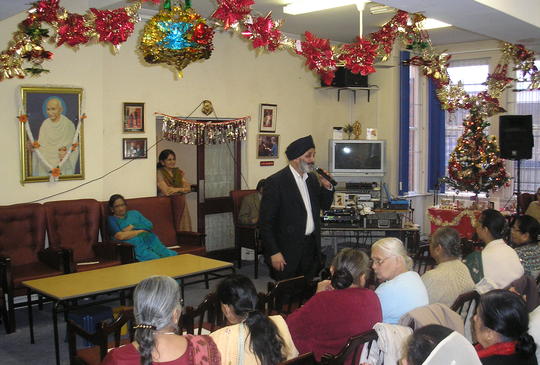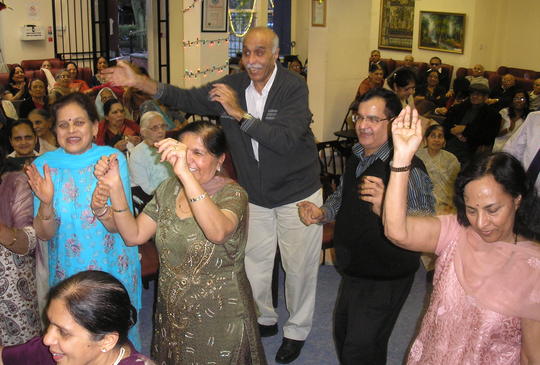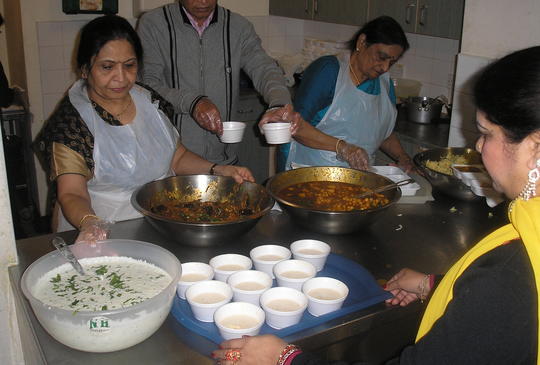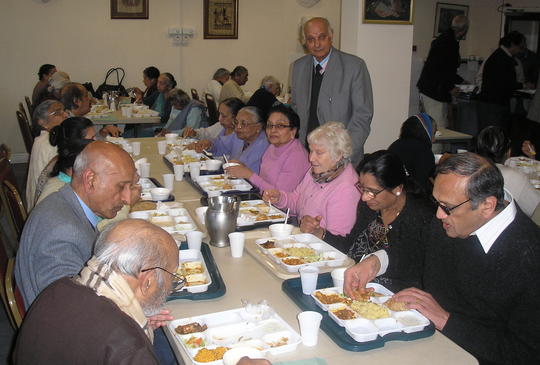
Indian senior citizens centre
“Our main purpose is to reduce loneliness and isolation. The majority of our members are about 65 and retired and live on their own. They haven’t got jobs and their children have moved away or are busy with their own family. So this place gives them socialisation and networking with people of the same age group, same language and same culture.”
Chhaya Kanani is the Centre Manager of the Indian Senior Citizens Centre. “I’m responsible for managing staff and volunteers, day-to-day running of the centre, doing the accounts, making funding applications, providing information to the four funding boroughs - Manchester, Stockport, Trafford and Bury - monthly, quarterly, half-yearly and yearly”, she explains.
She started as a volunteer in 1996, “doing admin work and filing”. Four weeks later, the Centre created a paid post for her. Now, eighteen years later, I am interviewing her for a project on the value of third sector community hubs in Greater Manchester.
I start by asking her about the history of the Centre and its purpose. She tells me that the Centre began, informally, in 1983, when the Indian Association in Manchester “decided that it needed to do more for its senior members”.
Once a week, she says, some of the younger members would pick them up and drive them to the Association’s centre on Brunswick Road in Withington, where they would “drink tea and coffee, eat snacks, put on the radio, play cards and pray”.
The Association also asked one of its members, Dr Das, a specialist geriatric consultant at Hope Hospital, to do a survey of their needs. “He found that a lot of them were feeling suicidal due to loneliness and isolation and that their culture, diet, dress and language were so different from those of other elderly people in their neighbourhoods that they found it difficult to participate in the activities that were provided. That”, she says, “is why the Centre was created: to give them socialisation and networking with people of the same age group, same language and same culture.”
Although membership is open to anyone over 50 years old, most of the members are over 65, retired and living alone. “They haven’t got jobs and their children have moved away or are busy with their own family. So they come here for the day, share their thoughts and do things together”, she says. They have various ethnic backgrounds (Punjabi, Urdu, Gujarati, Hindi); but, she explains, they have a lot in common.
The Centre grew rapidly. By 1998 it had 9 staff and 20 to 25 volunteers and was providing many more services, including preventative health care, the “second purpose of the Centre”.
Limited by the facilities of rented accommodation, it secured funding from the National Lottery and bought and moved into its current home on Whalley Road.
The move enabled the Centre to expand its preventative health care services. “We have so many services here and all under one roof. We provide lunch, exercise classes, such as yoga, physiotherapy, chiropody and a doctor comes in every week to check their blood sugar and blood pressure”, she says, adding that, once a week, she and her colleagues take the members shopping, as a group, “so they can learn from each other.”
What are the things that make this place work? Money is one thing, she says, because “without money we couldn’t do anything”; but, ultimately, it is about the people at the Centre. “What really make this place work are very dedicated volunteers, good staff and, above all, the members. If they were not here, we would not be here. They make it work.” For Chhaya, of course, making it work is partly about raising funds; and that has become a major challenge.
The Centre has been reliant for many years on funding from four local authorities: Manchester, Trafford, Stockport and Bury. That left it vulnerable to public spending cuts. Indeed, major grant cuts by two of the authorities in the last two or three years, left it with a very difficult decision. It consulted with its members and decided to close the building on Fridays, providing “the same level of services” over four days instead of five.
It was the only viable option, Chhaya says. “We cannot rely on volunteers to do everything. We need staff on the payroll who are responsible for managing the centre, including the volunteers.”
There are some longer-term options. The Centre has strong relationships with individuals and organisations in the Indian community, the public sector and the voluntary sector: holding open days for the Indian community; participating in national and local festivals; inviting councillors, mayors and NHS to the Centre; setting up a stall at a Town Hall and participating in a BME (Black Minority Ethnic) Alliance with other Indian, Chinese, Afro-Caribbean, Bangladeshi and South Indian organisations, which has produced a number of joint funding applications, including an application to the local Clinical Commissioning Group. The Centre is also thinking of letting a room or doing catering.
“If nothing works then obviously we will go to the community, to families and businesses,” she says. But she believes strongly that local authorities have a responsibility to look after the welfare of their citizens and that they “wouldn’t want to see the Centre close down.”
Acknowledgements
This interview is part of 'Realising the Potential of Community Hubs', a Greater Manchester Local Interaction Platform project.
Making people laugh: Brinnington Community Association, Stockport
Contributed by Alex Wharton
Contributor Profile
Alex is a Researcher at the Centre for Sustainable Urban and Regional Futures (SURF). He is currently working full-time on the Greater Manchester Local Interaction Platform (GM LIP), one of 5 LIP set up by Mistra Urban Futures, an international centre for sustainable urban futures, based in Gothenburg. His main interest is in the socio-economics of sustainable urban transitions - specifically, the relationship between economic growth and social justice, and the ways in which local authorities engage with local communities.








